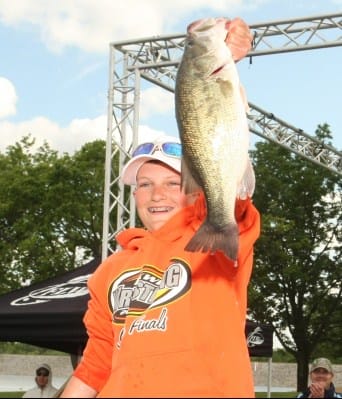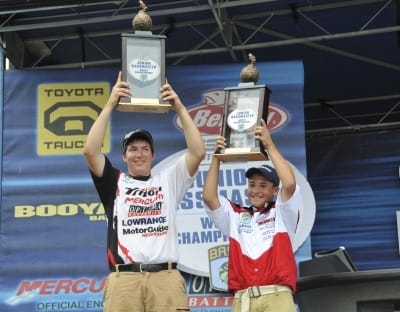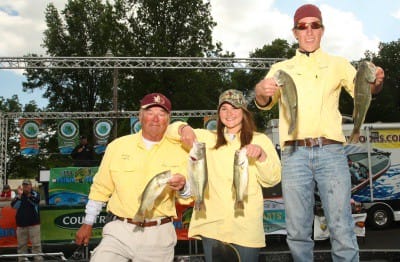Submitted By:
Steve Felgenhauer, USA Guest Author

What kid doesn’t dream of pitching in the World Series or standing on the podium to receive a gold medal at the Olympics? But the lack of – well, let’s put it bluntly – athletic ability prevents some kids from being competitive even among their classmates. I was part of that group so instead of sports, I chose to fish. The fish didn’t seem to care if I was fast or slow or whether I could catch or jump.
I had illusions of winning peer approval and wooing fair maidens using my fishing prowess. If only bass fishing were a high school sport.
Today, high school bass fishing is more than a pipe dream; it is a sanctioned high school activity.
High School Bass Fishing – The Beginning
Several high schools across the U.S. have embraced bass fishing into their school system thanks mainly to the efforts of Becky Gore, advisor of the Orange County High School (OCHS) Anglers, located in Orange County, Virginia.
Gore, a high school teacher and lifelong angler, knows the positive impact fishing can have from her own life experience. In 1994, Gore started a school affiliated fishing club, meeting several times monthly fishing in nearby ponds and rivers. Gore’s fishing club quickly caught the interest of The Bass Federation (TBF), a bass fishing organization, with visions of establishing high school fishing tournaments including a state championship bass tournament if more schools became involved and asked her to join the organization.
As a former fast pitch softball coach, Gore knew the satisfaction kids would achieve by competing and contemplated joining the organization. Only one hurdle stood in her way; convincing the school administration to go along with the idea.
Gore’s program attracted many kids, many of whom had been labeled wayward. However, once they started Gore’s program, these delinquents, turned dyed-in-the-wool bass anglers, and began changing their ways. They started showing up for class regularly. Bad attitudes changed and the confidence of the club members soared under Gore’s guidance. These changes did not go unnoticed by the school or its administration. Therefore, in 1999, when Gore asked for approval to join the TBF to fish the tournaments, the club had earned the respect and approval of the administration.
In 2004, TBF awarded the OCHS Anglers the “Most Outstanding Jr. Bass Program in the U.S.” The award allowed the group to attend the TBF award recognition ceremony in Orlando, Florida. This led the program to garner more interest and acceptance into the community.
Gore’s program has grown from 15 to more than 50 anglers, both male and female, all sharing the love of fishing, and has become the model for high school bass fishing programs across the nation.
Other states have followed Gore’s model, and while some have met with resistance from school administrations, many others have succeeded.
The state of Illinois also has several schools that like Gore’s program pioneered high school bass fishing. But instead of choosing individual fishing, they opted for team fishing and became a model program for other schools in their own rite.
High School Bass Fishing Growing by Leaps and Bounds

In July 2010, the Student Angler Federation (SAF) High School Fishing World Finals was held at Lake Dardanelle State Park in Russellville, Arkansas. The field included teams from 20 states competing in this event. This SAF tournament was the first of its kind, but certainly won’t be the last.
TBF National Youth Director Mark Gintert said, “High school fishing is one of the fastest growing sports, and we believe this event will further support a growth trend in every state, as it has in Illinois, where it’s now an official varsity sport.”
The Student Angler Federation is a division of The Bass Federation.
Another organization that nurtures and fuels young bass anglers is the Bass Anglers Sportsman Society (B.A.S.S.) which has created the Junior Bassmaster World (JWC) Championship. This BASS finale differs slightly from the TBF event with two different age categories, an 11- to 14-year-old division and a 15-to 18-year-old division. Like the adult divisions of the Federation Nation BASS tournaments, each region of the U.S. has a divisional tournament which qualifies anglers for the JWC, which focuses on bass fishing as an individual sport.
“The skill level and knowledge of these youth anglers is tremendous,” said Stacy Twiggs, senior manager, Federation Nation Youth. “We are beginning to see the JWC evolve into a feeder system into BASS top-level of events.”
The JWC is held on a different lake each year.

Scholarships for Bass Fishing?
The SAF tournament produced many firsts for high school bass fishing like college scholarships that totaled $32,000 for the winning two-man team. That’s right; Bethel University in McKenzie, Tennessee presented the first place team of Jared Raymer and Ethan Snyder of Meade County High School in Kentucky, a scholarship of $16,000 each for their accomplishment. The anglers also secured spots on the Bethel University Varsity Fishing Team where Bethel competes against other collegiate bass fishing teams. Bethel University is the first college in America to offer scholarships for bass fishing. Other schools are expected to follow suit.
Each winning angler in the BASS event was awarded a $5,000 scholarship for his achievement.
Bass fishing might never be an Olympic sport, but these high school athletes; they have struck gold.



